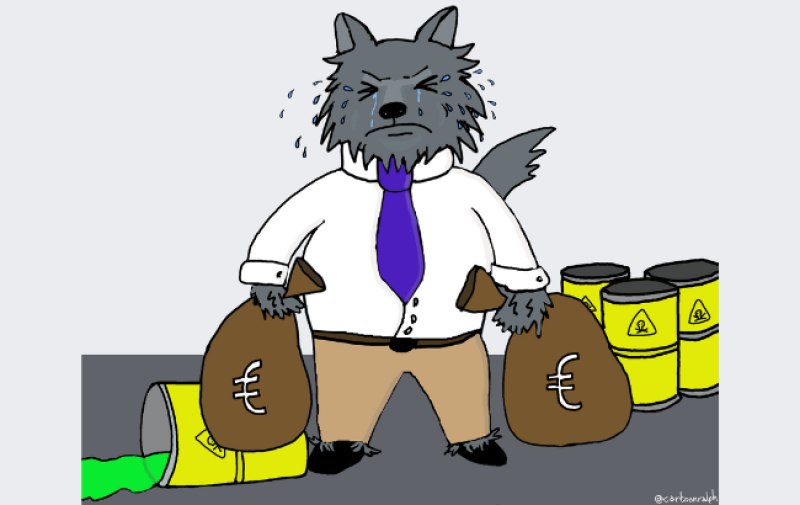Stay always informed
Interested in our articles? Get the latest information and analysis straight to your email. Sign up for our newsletter.

Cartoon by @CartoonRalph
Brussels, 00:01 CET, 19 February 2024 - European citizens are exposed to “alarmingly high levels of chemical substances”, eroding human health and contributing to the collapse of biodiversity. However, instead of urgently tackling the need to remove hazardous substances from the market, tomorrow, decision-makers will cosy up to Big Toxics to discuss a new "European Industrial Deal". In doing so, EU leaders have fallen for industry’s ‘cry wolf’ tactic.
This closed-door event is a collaboration between major chemical and industrial energy corporations and their lobby groups - including the European Chemical Industry Council (CEFIC), and its Belgian member Essenscia. It will take place on 20 February at BASF's chemicals plant in Antwerp, and shockingly, it is being organised under the auspices of the Belgian EU Presidency. Prime Minister Alexander De Croo will join the European Commission President Ursula von der Leyen, regional political leaders, and 60 or more corporate leaders. No NGOs have been invited, and the Belgian Federal Environmental Ministry has also been left out of the loop.
Corporate Europe Observatory's new research, “Crying wolf pays off for chemicals industry”, exposes the shift that has taken place in the past few years, from the ambition of the Green Deal to tackle hazardous substances, especially in consumer products and to half pesticide use, to tomorrow’s promotion of an Industrial Deal, with its demands for less regulation and more subsidy for business’ energy bills.
In particular, the investigation highlights how CEFIC’s impact assessment on aspects of the Green Deal followed an established industry lobby playbook. The figures in the study implied a disastrous impact on the industry from tougher chemicals regulation. Still, they were largely based on big business’ own estimates of the costs, and ignored, for example, the economic opportunities that could follow from the development of safe and sustainable alternative chemicals, and the health and environmental benefits that would follow.
The chemicals industry has deployed this ‘cry wolf’ tactic in the past despite its ongoing economic strength. Now politicians at the EU and member state levels have adopted a wider narrative that the chemicals industry, together with other intensive energy-using industries, need public support.
Vicky Cann, Corporate Europe Observatory researcher and campaigner, says: “It’s shocking that EU leaders are looking to bail out some of Europe’s most polluting industries via a proposed Industrial Deal when communities are living day to day with the consequences of corporate pollution. The industry likes to talk about the so-called ‘burden’ of regulation and the costs of energy. But what about the burden citizens face of living with environmental pollution, the resulting costs to public health and environmental budgets in dealing with its legacy, and the cost of living crisis? EU politicians must wake up to industry's ‘cry wolf’ tactics and instead focus on socially just solutions to the climate, biodiversity and toxic pollution crises. Instead of privileged access and corporate capture, it's time for toxic-free politics.”
Read the full article here
ENDS
For more information, contact:
Vicky Cann, Corporate Europe Observatory researcher and campaigner:
0044 7960 988096
Notes to editor